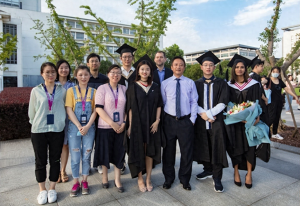2024-04-16
10:00 AM - 11:00 AM
SA136;https://core.xjtlu.edu.cn/mod/bigbluebuttonbn/view.php?id=58698
活动详情
■ 日期: 2024年4月16日,星期二
■ 时间: 10:00 a.m.-11:00 p.m.
■ 地点: SA136(线下)
线上: https://core.xjtlu.edu.cn/mod/bigbluebuttonbn/view.php?id=58698
■ 主讲人:Professor Steven Bull
■ 题名:Biorefineries for Sustainable Chemical Synthesis and Fluorescent Sensors for Investigating Biological Processes
■ 语言: 英语
活动简介
The first half of his presentation will describe his group’s efforts to develop a biorefinery based approach to catalytically upgrade biorenewable monoterpene feedstocks (e.g., turpentine, waste citrus oils, eucalyptus oils) into a variety of sustainable commodity chemicals, bioplastics and drugs that are currently derived from non-renewable petrochemical feedstocks.
The second half of the presentation will describe our efforts into developing fluorescent chemical sensors as investigational tools for probing complex biological processes in cellular systems, including for the real-time detection of osteocyte bone resorbing activity in deep bone cavities, imaging of amyloid-beta plaques in mice brains and visualisation of drug induced liver damage.
主讲人
Prof. Steven Bull received his Ph.D in Chemistry from the University of Cardiff, Wales (1990) and then carried out PDRA positions at the University of Queensland, Australia (1991-93) and the University of Oxford, UK (1994-2000) before moving to a drug discovery research position in industry at Oxford Asymmetry (1996-98). He then moved to the University of Bath in 2001 and rose through the ranks becoming Head of Organic Chemistry (2011-18) and Research Professor of Organic Chemistry (2015-2022). He has recently moved to take up the Head of School of Chemistry role at the University of Leicester in 2023.
Steve has a broad range of research interests in the fields of synthetic organic methodology, chemical biology, drug discovery, sustainable chemical technologies and chemical sensing that is maintained through collaborations with numerous internationally leading academic and industrial research groups. He has published >240 publications with >10,000 citations that currently attract a H index of 53, with his papers currently attracting ~1300 citations a year, which ranks him amongst the top 20 Organic Chemists in the UK. He has graduated >40 Ph.D students and supervised 20 PDRA from >10 different countries and was awarded University of Bath Prize for Excellence in Doctoral Supervision in 2014. His research contributions have been recognised by the award of 15 Prizes, Fellowships and Visiting Professorships.








